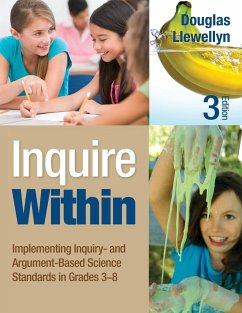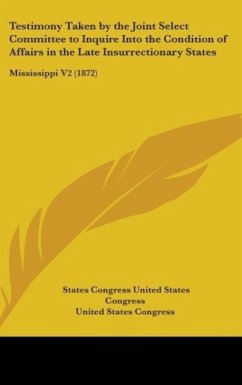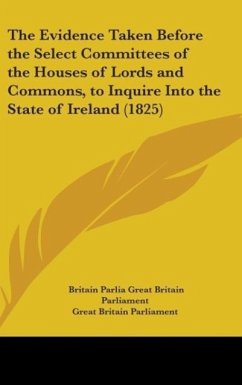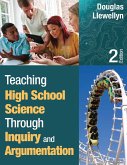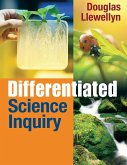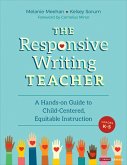Douglas J. Llewellyn
Inquire Within
Implementing Inquiry- and Argument-Based Science Standards in Grades 3-8
Douglas J. Llewellyn
Inquire Within
Implementing Inquiry- and Argument-Based Science Standards in Grades 3-8
- Broschiertes Buch
- Merkliste
- Auf die Merkliste
- Bewerten Bewerten
- Teilen
- Produkt teilen
- Produkterinnerung
- Produkterinnerung
A new edition for science teachers on teaching science through an inquiry-based process.
Andere Kunden interessierten sich auch für
![Testimony Taken By The Joint Select Committee To Inquire Into The Condition Of Affairs In The Late Insurrectionary States Testimony Taken By The Joint Select Committee To Inquire Into The Condition Of Affairs In The Late Insurrectionary States]() United States CongressTestimony Taken By The Joint Select Committee To Inquire Into The Condition Of Affairs In The Late Insurrectionary States54,99 €
United States CongressTestimony Taken By The Joint Select Committee To Inquire Into The Condition Of Affairs In The Late Insurrectionary States54,99 €![Testimony Taken By The Joint Select Committee To Inquire Into The Condition Of Affairs In The Late Insurrectionary States Testimony Taken By The Joint Select Committee To Inquire Into The Condition Of Affairs In The Late Insurrectionary States]() Joint Select CommitteeTestimony Taken By The Joint Select Committee To Inquire Into The Condition Of Affairs In The Late Insurrectionary States56,99 €
Joint Select CommitteeTestimony Taken By The Joint Select Committee To Inquire Into The Condition Of Affairs In The Late Insurrectionary States56,99 €![Testimony Taken By The Joint Select Committee Appointed To Inquire In To The Condition Of Affairs In The Late Insurrectionary States Testimony Taken By The Joint Select Committee Appointed To Inquire In To The Condition Of Affairs In The Late Insurrectionary States]() The Joint Select CommitteeTestimony Taken By The Joint Select Committee Appointed To Inquire In To The Condition Of Affairs In The Late Insurrectionary States59,99 €
The Joint Select CommitteeTestimony Taken By The Joint Select Committee Appointed To Inquire In To The Condition Of Affairs In The Late Insurrectionary States59,99 €![The Evidence Taken Before The Select Committees Of The Houses Of Lords And Commons, To Inquire Into The State Of Ireland (1825) The Evidence Taken Before The Select Committees Of The Houses Of Lords And Commons, To Inquire Into The State Of Ireland (1825)]() Great Britain ParliamentThe Evidence Taken Before The Select Committees Of The Houses Of Lords And Commons, To Inquire Into The State Of Ireland (1825)54,99 €
Great Britain ParliamentThe Evidence Taken Before The Select Committees Of The Houses Of Lords And Commons, To Inquire Into The State Of Ireland (1825)54,99 €![Teaching High School Science Through Inquiry and Argumentation Teaching High School Science Through Inquiry and Argumentation]() Douglas J. LlewellynTeaching High School Science Through Inquiry and Argumentation45,99 €
Douglas J. LlewellynTeaching High School Science Through Inquiry and Argumentation45,99 €![Differentiated Science Inquiry Differentiated Science Inquiry]() Douglas J. LlewellynDifferentiated Science Inquiry40,99 €
Douglas J. LlewellynDifferentiated Science Inquiry40,99 €![The Responsive Writing Teacher, Grades K-5 The Responsive Writing Teacher, Grades K-5]() Melanie Meehan (Simsbury Public Schools)The Responsive Writing Teacher, Grades K-542,99 €
Melanie Meehan (Simsbury Public Schools)The Responsive Writing Teacher, Grades K-542,99 €-
-
-
A new edition for science teachers on teaching science through an inquiry-based process.
Hinweis: Dieser Artikel kann nur an eine deutsche Lieferadresse ausgeliefert werden.
Hinweis: Dieser Artikel kann nur an eine deutsche Lieferadresse ausgeliefert werden.
Produktdetails
- Produktdetails
- Verlag: SAGE Publications Inc
- 3 Revised edition
- Seitenzahl: 392
- Erscheinungstermin: 2. Dezember 2013
- Englisch
- Abmessung: 280mm x 216mm x 21mm
- Gewicht: 1056g
- ISBN-13: 9781452299280
- ISBN-10: 1452299285
- Artikelnr.: 39345020
- Herstellerkennzeichnung
- Libri GmbH
- Europaallee 1
- 36244 Bad Hersfeld
- gpsr@libri.de
- Verlag: SAGE Publications Inc
- 3 Revised edition
- Seitenzahl: 392
- Erscheinungstermin: 2. Dezember 2013
- Englisch
- Abmessung: 280mm x 216mm x 21mm
- Gewicht: 1056g
- ISBN-13: 9781452299280
- ISBN-10: 1452299285
- Artikelnr.: 39345020
- Herstellerkennzeichnung
- Libri GmbH
- Europaallee 1
- 36244 Bad Hersfeld
- gpsr@libri.de
Douglas Llewellyn teaches science education courses at St. John Fisher College in Rochester, NY. Previously, he was the K-12 Director of Science at the Rochester City School District, a secondary school principal, and a middle school science teacher. Llewellyn is a frequent speaker at state and national conferences on inquiry- and argument-based teaching, constructivist learning, and science leadership.
Preface A Major Shift in Achieving Scientific Literacy What
s New in the Third Edition? Who Should Read This Book? Acknowledgments About the Author Chapter 1. Constructing an Understanding of Science Inquiry What the Exploratorium Means by Inquiry What the National Science Education Standards Say About Inquiry What the National Science Teachers Association Says About Inquiry What A Framework for K-12 Science Education and the Next Generation Science Standards Say About Inquiry Twelve Beliefs (and Rebuttals) About Inquiry-Based Teaching and Learning Inquiry as a Thinking Skill "Inquiring With Fruit" The Inquiry Cycle A Definition of Inquiry Inquiry and Scientific Literacy Inquiry and the Nature of Science Inquiry and Naturalistic Intelligence One More Look at Defining Scientific Inquiry Questions for Reflection and Discussion Chapter 2. Integrating Language Arts and Argumentation Into Science The Common Core State Standards and Science: A Natural Pairing A Fourth-Grade Integrated Language Arts and Science Lesson on Levers The Influence of Media on Children What Is a Scientific Argument? Parts of an Argument Making a Case for Argumentation What A Framework for K-12 Science Education and the Next Generation Science Standards Say About Argumentation Scaffolding Toward Argumentation Verbal Prompts Painting a Picture of What Real Scientists Do Questions for Reflection and Discussion Chapter 3. Choosing to Become an Inquiry-Based Teacher Self-Directed Learning What
s Your Instructional Pie? Steps in Becoming an Inquiry-Based Teacher Monitoring Your Progress An Inquiry Self-Assessment Survey Your First Try at Inquiry The Importance of Modeling Making a Commitment Building Capacity Through Bugs-o-Copters Your IQ: Inquiry Quotient Questions for Reflection and Discussion Chapter 4. Developing a Mind-Set for Inquiry What Is Constructivism? The Constructivist Learning Model The Conceptual Change Model Can I Change My Mind? Misconceptions: What You Know May Not Be So Where Do Misconceptions Come From? Comparing the Earth and the Moon How Far Is the Moon? Why Teach to Misconceptions? Uncovering Misconceptions in Science Historical Development of Constructivism Constructivism Today How Children Learn Science Mother Goose as a Scientist The Child as a Scientist All Things Are Possible Questions for Reflection and Discussion Chapter 5. Different Approaches for Teaching Through Inquiry Why Johnny Can
t Inquire Promoting Student Inquiries Invitation to Inquiry Demonstrated Inquiries Structured Inquiries Guided or Teacher-Initiated Inquiries Self-Directed or Student-Initiated Inquiries The Role of the Teacher for Each Approach Guiding Students Into Inquiry Investigating Balls and Ramps K-W-L Charts An Invitation to Inquiry Grid Summary Modifying a Traditional Lab Into an Inquiry Investigation Two Contrasting Models of Teaching The 5E Learning Cycle Investigating Mealworms The Constructivist Inquiry Cycle Effective Inquiry- and Argument-Based Teaching Questions for Reflection and Discussion Chapter 6. Designing Problem-Solving and Inquiry- and Argument-Based Investigations The Myth of the Scientific Method How Scientists Use Models in Science Scientific Problem Solving A Model for Scientific Problem Solving The Benefits of Scientific Problem-Solving Activities Scientific Problem Solving Versus Inquiry Seven Segments of Inquiry Differentiated Science Inquiry A Pendulum Investigation Science Process Skill Stations Argument-Based Investigations Questions for Reflection and Discussion Chapter 7. Managing the Inquiry-Based Classroom Making Time for Inquiry and Argumentation Avoiding a Lockstep Approach Establishing the Right Atmosphere Teaching Inquiry to Second Language Learners and Students With Special Needs Strategies for Integrating Language Instruction Into Science Integrating Inquiry With Technology Assessing and Monitoring Your Classroom Management Strategies Questions for Reflection and Discussion Chapter 8. Developing Effective Questioning Skills for Science Inquiry Quality Questions Model Quality Thinking Classroom Questions Bloom
s Taxonomy Answering Questions and Questioning Answers Clarifying, Focusing, Prompting, and Probing Questions Expository Questions The Interaction of Expository Questioning 15 Tips for Helping You Frame Your Expository Questions The Power of Praise and Positive Reinforcement A Three-Step Approach to Better Questioning Exploratory Questions Why You Can
t Investigate a "Why" Question Recalibrate Your Questioning Skills Questions for Reflection and Discussion Chapter 9. Assessing Science Inquiry The Anxiety Over Testing Testing Versus Assessment Versus Evaluation Curriculum Alignment Assessing Inquiry-Based Science Three Categories of Assessment Designing Assessments Choosing the Right Test Differentiated Assessment Using a Multiple-Assessment Approach Authentic Assessments Transitioning to New Assessment Systems Questions for Reflection and Discussion Chapter 10. Creating a Classroom Culture of Inquiry and Argumentation Traditional and Inquiry-Centered Classrooms Design Your Inquiry-Centered Classroom Students in an Inquiry-Centered Classroom Teachers in an Inquiry-Centered Classroom Constructing a Graphic Organizer of an Inquiry-Centered Classroom Teachers as Agents of Change Highly Effective Science Teachers Final Thoughts: Your Legacy Questions for Reflection and Discussion Resource A. Resources for Teachers Print Resources on Inquiry- and Argument-Based Teaching Print Resources on Designing Inquiry- and Argument-Based Investigations Print Resources on Constructivism Print Resources on Different Approaches to Science Inquiry Print Resources on Science Standards and Reform Print Resources on Science Literacy, History of Science, and the Nature of Science Print Resources on Demonstrated Inquiries and Discrepant Events Print Resources on Second Language Learners Print Resources on Effective Questioning Skills Print Resources on Assessment Online Resources on Inquiry Professional Organizations Resource B. Lever Lesson Plan Resource C. Bottle Resource D. Rubric for Becoming an Inquiry-Based Teacher Resource E. Inquiry Self-Assessment Response Grids Resource F. Inquiry Self-Assessment Summary Matrix Resource G. Short-Eared and Long-Eared Bugs-o-Copters Resource H. Investigating Oobleck Resource I. Seven Segments of Inquiry Resource J. How to Make a Cartesian Diver Resource K. Touch Squares Resource L. 18 Concept Statements References Index
s New in the Third Edition? Who Should Read This Book? Acknowledgments About the Author Chapter 1. Constructing an Understanding of Science Inquiry What the Exploratorium Means by Inquiry What the National Science Education Standards Say About Inquiry What the National Science Teachers Association Says About Inquiry What A Framework for K-12 Science Education and the Next Generation Science Standards Say About Inquiry Twelve Beliefs (and Rebuttals) About Inquiry-Based Teaching and Learning Inquiry as a Thinking Skill "Inquiring With Fruit" The Inquiry Cycle A Definition of Inquiry Inquiry and Scientific Literacy Inquiry and the Nature of Science Inquiry and Naturalistic Intelligence One More Look at Defining Scientific Inquiry Questions for Reflection and Discussion Chapter 2. Integrating Language Arts and Argumentation Into Science The Common Core State Standards and Science: A Natural Pairing A Fourth-Grade Integrated Language Arts and Science Lesson on Levers The Influence of Media on Children What Is a Scientific Argument? Parts of an Argument Making a Case for Argumentation What A Framework for K-12 Science Education and the Next Generation Science Standards Say About Argumentation Scaffolding Toward Argumentation Verbal Prompts Painting a Picture of What Real Scientists Do Questions for Reflection and Discussion Chapter 3. Choosing to Become an Inquiry-Based Teacher Self-Directed Learning What
s Your Instructional Pie? Steps in Becoming an Inquiry-Based Teacher Monitoring Your Progress An Inquiry Self-Assessment Survey Your First Try at Inquiry The Importance of Modeling Making a Commitment Building Capacity Through Bugs-o-Copters Your IQ: Inquiry Quotient Questions for Reflection and Discussion Chapter 4. Developing a Mind-Set for Inquiry What Is Constructivism? The Constructivist Learning Model The Conceptual Change Model Can I Change My Mind? Misconceptions: What You Know May Not Be So Where Do Misconceptions Come From? Comparing the Earth and the Moon How Far Is the Moon? Why Teach to Misconceptions? Uncovering Misconceptions in Science Historical Development of Constructivism Constructivism Today How Children Learn Science Mother Goose as a Scientist The Child as a Scientist All Things Are Possible Questions for Reflection and Discussion Chapter 5. Different Approaches for Teaching Through Inquiry Why Johnny Can
t Inquire Promoting Student Inquiries Invitation to Inquiry Demonstrated Inquiries Structured Inquiries Guided or Teacher-Initiated Inquiries Self-Directed or Student-Initiated Inquiries The Role of the Teacher for Each Approach Guiding Students Into Inquiry Investigating Balls and Ramps K-W-L Charts An Invitation to Inquiry Grid Summary Modifying a Traditional Lab Into an Inquiry Investigation Two Contrasting Models of Teaching The 5E Learning Cycle Investigating Mealworms The Constructivist Inquiry Cycle Effective Inquiry- and Argument-Based Teaching Questions for Reflection and Discussion Chapter 6. Designing Problem-Solving and Inquiry- and Argument-Based Investigations The Myth of the Scientific Method How Scientists Use Models in Science Scientific Problem Solving A Model for Scientific Problem Solving The Benefits of Scientific Problem-Solving Activities Scientific Problem Solving Versus Inquiry Seven Segments of Inquiry Differentiated Science Inquiry A Pendulum Investigation Science Process Skill Stations Argument-Based Investigations Questions for Reflection and Discussion Chapter 7. Managing the Inquiry-Based Classroom Making Time for Inquiry and Argumentation Avoiding a Lockstep Approach Establishing the Right Atmosphere Teaching Inquiry to Second Language Learners and Students With Special Needs Strategies for Integrating Language Instruction Into Science Integrating Inquiry With Technology Assessing and Monitoring Your Classroom Management Strategies Questions for Reflection and Discussion Chapter 8. Developing Effective Questioning Skills for Science Inquiry Quality Questions Model Quality Thinking Classroom Questions Bloom
s Taxonomy Answering Questions and Questioning Answers Clarifying, Focusing, Prompting, and Probing Questions Expository Questions The Interaction of Expository Questioning 15 Tips for Helping You Frame Your Expository Questions The Power of Praise and Positive Reinforcement A Three-Step Approach to Better Questioning Exploratory Questions Why You Can
t Investigate a "Why" Question Recalibrate Your Questioning Skills Questions for Reflection and Discussion Chapter 9. Assessing Science Inquiry The Anxiety Over Testing Testing Versus Assessment Versus Evaluation Curriculum Alignment Assessing Inquiry-Based Science Three Categories of Assessment Designing Assessments Choosing the Right Test Differentiated Assessment Using a Multiple-Assessment Approach Authentic Assessments Transitioning to New Assessment Systems Questions for Reflection and Discussion Chapter 10. Creating a Classroom Culture of Inquiry and Argumentation Traditional and Inquiry-Centered Classrooms Design Your Inquiry-Centered Classroom Students in an Inquiry-Centered Classroom Teachers in an Inquiry-Centered Classroom Constructing a Graphic Organizer of an Inquiry-Centered Classroom Teachers as Agents of Change Highly Effective Science Teachers Final Thoughts: Your Legacy Questions for Reflection and Discussion Resource A. Resources for Teachers Print Resources on Inquiry- and Argument-Based Teaching Print Resources on Designing Inquiry- and Argument-Based Investigations Print Resources on Constructivism Print Resources on Different Approaches to Science Inquiry Print Resources on Science Standards and Reform Print Resources on Science Literacy, History of Science, and the Nature of Science Print Resources on Demonstrated Inquiries and Discrepant Events Print Resources on Second Language Learners Print Resources on Effective Questioning Skills Print Resources on Assessment Online Resources on Inquiry Professional Organizations Resource B. Lever Lesson Plan Resource C. Bottle Resource D. Rubric for Becoming an Inquiry-Based Teacher Resource E. Inquiry Self-Assessment Response Grids Resource F. Inquiry Self-Assessment Summary Matrix Resource G. Short-Eared and Long-Eared Bugs-o-Copters Resource H. Investigating Oobleck Resource I. Seven Segments of Inquiry Resource J. How to Make a Cartesian Diver Resource K. Touch Squares Resource L. 18 Concept Statements References Index
Preface A Major Shift in Achieving Scientific Literacy What
s New in the Third Edition? Who Should Read This Book? Acknowledgments About the Author Chapter 1. Constructing an Understanding of Science Inquiry What the Exploratorium Means by Inquiry What the National Science Education Standards Say About Inquiry What the National Science Teachers Association Says About Inquiry What A Framework for K-12 Science Education and the Next Generation Science Standards Say About Inquiry Twelve Beliefs (and Rebuttals) About Inquiry-Based Teaching and Learning Inquiry as a Thinking Skill "Inquiring With Fruit" The Inquiry Cycle A Definition of Inquiry Inquiry and Scientific Literacy Inquiry and the Nature of Science Inquiry and Naturalistic Intelligence One More Look at Defining Scientific Inquiry Questions for Reflection and Discussion Chapter 2. Integrating Language Arts and Argumentation Into Science The Common Core State Standards and Science: A Natural Pairing A Fourth-Grade Integrated Language Arts and Science Lesson on Levers The Influence of Media on Children What Is a Scientific Argument? Parts of an Argument Making a Case for Argumentation What A Framework for K-12 Science Education and the Next Generation Science Standards Say About Argumentation Scaffolding Toward Argumentation Verbal Prompts Painting a Picture of What Real Scientists Do Questions for Reflection and Discussion Chapter 3. Choosing to Become an Inquiry-Based Teacher Self-Directed Learning What
s Your Instructional Pie? Steps in Becoming an Inquiry-Based Teacher Monitoring Your Progress An Inquiry Self-Assessment Survey Your First Try at Inquiry The Importance of Modeling Making a Commitment Building Capacity Through Bugs-o-Copters Your IQ: Inquiry Quotient Questions for Reflection and Discussion Chapter 4. Developing a Mind-Set for Inquiry What Is Constructivism? The Constructivist Learning Model The Conceptual Change Model Can I Change My Mind? Misconceptions: What You Know May Not Be So Where Do Misconceptions Come From? Comparing the Earth and the Moon How Far Is the Moon? Why Teach to Misconceptions? Uncovering Misconceptions in Science Historical Development of Constructivism Constructivism Today How Children Learn Science Mother Goose as a Scientist The Child as a Scientist All Things Are Possible Questions for Reflection and Discussion Chapter 5. Different Approaches for Teaching Through Inquiry Why Johnny Can
t Inquire Promoting Student Inquiries Invitation to Inquiry Demonstrated Inquiries Structured Inquiries Guided or Teacher-Initiated Inquiries Self-Directed or Student-Initiated Inquiries The Role of the Teacher for Each Approach Guiding Students Into Inquiry Investigating Balls and Ramps K-W-L Charts An Invitation to Inquiry Grid Summary Modifying a Traditional Lab Into an Inquiry Investigation Two Contrasting Models of Teaching The 5E Learning Cycle Investigating Mealworms The Constructivist Inquiry Cycle Effective Inquiry- and Argument-Based Teaching Questions for Reflection and Discussion Chapter 6. Designing Problem-Solving and Inquiry- and Argument-Based Investigations The Myth of the Scientific Method How Scientists Use Models in Science Scientific Problem Solving A Model for Scientific Problem Solving The Benefits of Scientific Problem-Solving Activities Scientific Problem Solving Versus Inquiry Seven Segments of Inquiry Differentiated Science Inquiry A Pendulum Investigation Science Process Skill Stations Argument-Based Investigations Questions for Reflection and Discussion Chapter 7. Managing the Inquiry-Based Classroom Making Time for Inquiry and Argumentation Avoiding a Lockstep Approach Establishing the Right Atmosphere Teaching Inquiry to Second Language Learners and Students With Special Needs Strategies for Integrating Language Instruction Into Science Integrating Inquiry With Technology Assessing and Monitoring Your Classroom Management Strategies Questions for Reflection and Discussion Chapter 8. Developing Effective Questioning Skills for Science Inquiry Quality Questions Model Quality Thinking Classroom Questions Bloom
s Taxonomy Answering Questions and Questioning Answers Clarifying, Focusing, Prompting, and Probing Questions Expository Questions The Interaction of Expository Questioning 15 Tips for Helping You Frame Your Expository Questions The Power of Praise and Positive Reinforcement A Three-Step Approach to Better Questioning Exploratory Questions Why You Can
t Investigate a "Why" Question Recalibrate Your Questioning Skills Questions for Reflection and Discussion Chapter 9. Assessing Science Inquiry The Anxiety Over Testing Testing Versus Assessment Versus Evaluation Curriculum Alignment Assessing Inquiry-Based Science Three Categories of Assessment Designing Assessments Choosing the Right Test Differentiated Assessment Using a Multiple-Assessment Approach Authentic Assessments Transitioning to New Assessment Systems Questions for Reflection and Discussion Chapter 10. Creating a Classroom Culture of Inquiry and Argumentation Traditional and Inquiry-Centered Classrooms Design Your Inquiry-Centered Classroom Students in an Inquiry-Centered Classroom Teachers in an Inquiry-Centered Classroom Constructing a Graphic Organizer of an Inquiry-Centered Classroom Teachers as Agents of Change Highly Effective Science Teachers Final Thoughts: Your Legacy Questions for Reflection and Discussion Resource A. Resources for Teachers Print Resources on Inquiry- and Argument-Based Teaching Print Resources on Designing Inquiry- and Argument-Based Investigations Print Resources on Constructivism Print Resources on Different Approaches to Science Inquiry Print Resources on Science Standards and Reform Print Resources on Science Literacy, History of Science, and the Nature of Science Print Resources on Demonstrated Inquiries and Discrepant Events Print Resources on Second Language Learners Print Resources on Effective Questioning Skills Print Resources on Assessment Online Resources on Inquiry Professional Organizations Resource B. Lever Lesson Plan Resource C. Bottle Resource D. Rubric for Becoming an Inquiry-Based Teacher Resource E. Inquiry Self-Assessment Response Grids Resource F. Inquiry Self-Assessment Summary Matrix Resource G. Short-Eared and Long-Eared Bugs-o-Copters Resource H. Investigating Oobleck Resource I. Seven Segments of Inquiry Resource J. How to Make a Cartesian Diver Resource K. Touch Squares Resource L. 18 Concept Statements References Index
s New in the Third Edition? Who Should Read This Book? Acknowledgments About the Author Chapter 1. Constructing an Understanding of Science Inquiry What the Exploratorium Means by Inquiry What the National Science Education Standards Say About Inquiry What the National Science Teachers Association Says About Inquiry What A Framework for K-12 Science Education and the Next Generation Science Standards Say About Inquiry Twelve Beliefs (and Rebuttals) About Inquiry-Based Teaching and Learning Inquiry as a Thinking Skill "Inquiring With Fruit" The Inquiry Cycle A Definition of Inquiry Inquiry and Scientific Literacy Inquiry and the Nature of Science Inquiry and Naturalistic Intelligence One More Look at Defining Scientific Inquiry Questions for Reflection and Discussion Chapter 2. Integrating Language Arts and Argumentation Into Science The Common Core State Standards and Science: A Natural Pairing A Fourth-Grade Integrated Language Arts and Science Lesson on Levers The Influence of Media on Children What Is a Scientific Argument? Parts of an Argument Making a Case for Argumentation What A Framework for K-12 Science Education and the Next Generation Science Standards Say About Argumentation Scaffolding Toward Argumentation Verbal Prompts Painting a Picture of What Real Scientists Do Questions for Reflection and Discussion Chapter 3. Choosing to Become an Inquiry-Based Teacher Self-Directed Learning What
s Your Instructional Pie? Steps in Becoming an Inquiry-Based Teacher Monitoring Your Progress An Inquiry Self-Assessment Survey Your First Try at Inquiry The Importance of Modeling Making a Commitment Building Capacity Through Bugs-o-Copters Your IQ: Inquiry Quotient Questions for Reflection and Discussion Chapter 4. Developing a Mind-Set for Inquiry What Is Constructivism? The Constructivist Learning Model The Conceptual Change Model Can I Change My Mind? Misconceptions: What You Know May Not Be So Where Do Misconceptions Come From? Comparing the Earth and the Moon How Far Is the Moon? Why Teach to Misconceptions? Uncovering Misconceptions in Science Historical Development of Constructivism Constructivism Today How Children Learn Science Mother Goose as a Scientist The Child as a Scientist All Things Are Possible Questions for Reflection and Discussion Chapter 5. Different Approaches for Teaching Through Inquiry Why Johnny Can
t Inquire Promoting Student Inquiries Invitation to Inquiry Demonstrated Inquiries Structured Inquiries Guided or Teacher-Initiated Inquiries Self-Directed or Student-Initiated Inquiries The Role of the Teacher for Each Approach Guiding Students Into Inquiry Investigating Balls and Ramps K-W-L Charts An Invitation to Inquiry Grid Summary Modifying a Traditional Lab Into an Inquiry Investigation Two Contrasting Models of Teaching The 5E Learning Cycle Investigating Mealworms The Constructivist Inquiry Cycle Effective Inquiry- and Argument-Based Teaching Questions for Reflection and Discussion Chapter 6. Designing Problem-Solving and Inquiry- and Argument-Based Investigations The Myth of the Scientific Method How Scientists Use Models in Science Scientific Problem Solving A Model for Scientific Problem Solving The Benefits of Scientific Problem-Solving Activities Scientific Problem Solving Versus Inquiry Seven Segments of Inquiry Differentiated Science Inquiry A Pendulum Investigation Science Process Skill Stations Argument-Based Investigations Questions for Reflection and Discussion Chapter 7. Managing the Inquiry-Based Classroom Making Time for Inquiry and Argumentation Avoiding a Lockstep Approach Establishing the Right Atmosphere Teaching Inquiry to Second Language Learners and Students With Special Needs Strategies for Integrating Language Instruction Into Science Integrating Inquiry With Technology Assessing and Monitoring Your Classroom Management Strategies Questions for Reflection and Discussion Chapter 8. Developing Effective Questioning Skills for Science Inquiry Quality Questions Model Quality Thinking Classroom Questions Bloom
s Taxonomy Answering Questions and Questioning Answers Clarifying, Focusing, Prompting, and Probing Questions Expository Questions The Interaction of Expository Questioning 15 Tips for Helping You Frame Your Expository Questions The Power of Praise and Positive Reinforcement A Three-Step Approach to Better Questioning Exploratory Questions Why You Can
t Investigate a "Why" Question Recalibrate Your Questioning Skills Questions for Reflection and Discussion Chapter 9. Assessing Science Inquiry The Anxiety Over Testing Testing Versus Assessment Versus Evaluation Curriculum Alignment Assessing Inquiry-Based Science Three Categories of Assessment Designing Assessments Choosing the Right Test Differentiated Assessment Using a Multiple-Assessment Approach Authentic Assessments Transitioning to New Assessment Systems Questions for Reflection and Discussion Chapter 10. Creating a Classroom Culture of Inquiry and Argumentation Traditional and Inquiry-Centered Classrooms Design Your Inquiry-Centered Classroom Students in an Inquiry-Centered Classroom Teachers in an Inquiry-Centered Classroom Constructing a Graphic Organizer of an Inquiry-Centered Classroom Teachers as Agents of Change Highly Effective Science Teachers Final Thoughts: Your Legacy Questions for Reflection and Discussion Resource A. Resources for Teachers Print Resources on Inquiry- and Argument-Based Teaching Print Resources on Designing Inquiry- and Argument-Based Investigations Print Resources on Constructivism Print Resources on Different Approaches to Science Inquiry Print Resources on Science Standards and Reform Print Resources on Science Literacy, History of Science, and the Nature of Science Print Resources on Demonstrated Inquiries and Discrepant Events Print Resources on Second Language Learners Print Resources on Effective Questioning Skills Print Resources on Assessment Online Resources on Inquiry Professional Organizations Resource B. Lever Lesson Plan Resource C. Bottle Resource D. Rubric for Becoming an Inquiry-Based Teacher Resource E. Inquiry Self-Assessment Response Grids Resource F. Inquiry Self-Assessment Summary Matrix Resource G. Short-Eared and Long-Eared Bugs-o-Copters Resource H. Investigating Oobleck Resource I. Seven Segments of Inquiry Resource J. How to Make a Cartesian Diver Resource K. Touch Squares Resource L. 18 Concept Statements References Index

